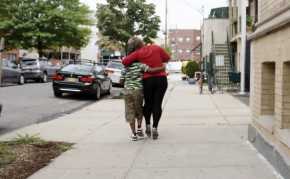
To meet the needs of people with serious mental illness returning to their communities, we need solutions that offer affordable housing alongside supportive social services.
For the millions of people returning from jail and prison each year, stable, affordable housing is vital to building a better future.
Housing is the bedrock for doing well in every aspect of life—school, work, health, and family. Yet there are a disproportionate number of people in the legal system struggling with serious mental illness, making it even harder to secure a safe, stable home. Lack of housing, in turn, makes it more likely that people will be incarcerated again, often leading to a vicious cycle.
To really meet people’s needs and build lasting public safety, we need solutions that provide sufficient funding for affordable housing options alongside supportive social services, from mental health and substance use treatment to education and employment assistance and more.
As part of its efforts to transform access to mental health care for some of the most vulnerable New Yorkers, the state’s Office of Mental Health is investing in innovative housing programs that include a social service component for people with serious mental illness returning from incarceration. Effectively serving this population requires deep expertise with the complex needs of people who have fallen through the cracks of many different systems, people who often need more than traditional mental health treatment.
Bridging the gap between government agencies and service providers with experience on the ground is key to making these investments work in practice. That’s why our Institute for Justice Policy Implementation—which we lead in partnership with New York Law School—hosted an event to connect the Office of Mental Health to a community of service providers with expertise in the intersection of housing, mental illness, and the criminal justice system. Drawing from the insights of this diverse group of providers, the Office of Mental Health developed three new requests for proposals focused on delivering robust care with the flexibility to meet the complex, shifting needs of people with serious mental illness returning to their communities.
These flexible models of care will include services like individualized mental health treatment, education and career planning, financial empowerment, conflict de-escalation, and guidance with strengthening family and personal relationships to help people build a lasting network of support within their own communities. Instead of being limited to hospital or clinic-based services, they’ll also help people gain stability in their daily lives. The goal is not just to address needs that have long gone unmet, but also to support people in building the skills and resources they need to succeed on their own in the future.
For many people living with serious mental illness, substance use, and other overlapping challenges, the justice system is often the last in a long list of institutions that have failed to meet their needs. We can do better for this vulnerable population, bringing government and service providers together to invest in housing and get people the care they may have never received before. That, in turn, makes for safer communities for all of us.
For more information, see the Office of Mental Health’s recent requests for proposals:

